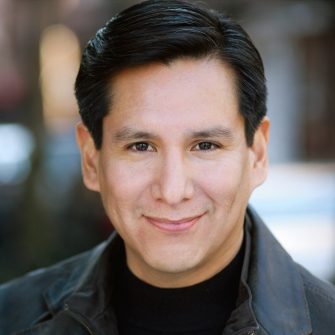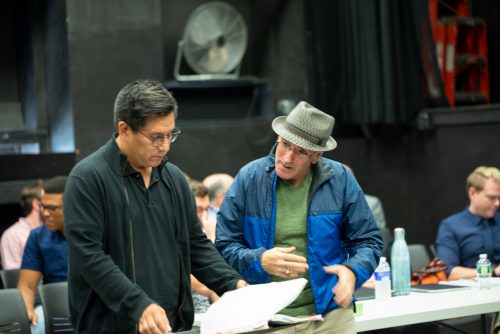By Benjamin Willmott
The Eastman School of Music was pleased to welcome the appointment of Mr. Timothy Long to the faculty as associate professor of opera and music director of Eastman Opera Theatre, starting in fall 2018. Mr. Long’s appointment comes following the retirement of Benton Hess, the esteemed music director of the program for close to two decades. Long joined Eastman after spending over twenty years at Stony Brook University as a faculty member and music director of Stony Brook Opera. He also served as assistant conductor (under Robert Spano) at the Brooklyn Philharmonic and was subsequently named an associate conductor at New York City Opera for two years. This new position is actually a return for Mr. Long to his Alma Mater, where he earned a Master of Music degree in 1992.
Benjamin Willmott of the Friends of the Eastman Opera (FEO) sat down with Mr. Long in October 2018 to ask him questions about his background and plans.
FEO: You are originally from Oklahoma. Do you still have family there? Can you tell us a little bit about your upbringing?
Timothy Long: I have a lot of extended family still in Oklahoma. My mom grew up in an Indian orphanage in a tiny town in southeastern Oklahoma. When she was in high school she caught tuberculosis before there was treatment, and she ended up quarantined for five years in an Indian hospital in a town called Talihina. She said everybody at the hospital listened to country western music and she got sick of the twang. She found a classical radio station and when my sister and I were born she only listened to Beethoven. So we only heard Beethoven symphonies, piano concertos, and piano sonatas when I was a kid. I say that I was this little Indian kid in Southeastern Oklahoma with a Germanic education. I got a toy piano when I was three and I started playing that nonstop.
My mom got me music lessons with a local girl who was fifteen. I was her very first student. She played piano and sang. She was very good, although she was completely new to teaching. So, lucky me, she started me on theory lessons when I was five. I understood theory before I could read words. I had a theory coloring book; my mom would read me the questions and I would color in the answers. I had a movie music songbook, I played pop music. So really the first time I ever heard non-Beethoven was when I started playing the piano.
My sister joined the band when she was in fifth grade; she was two grades ahead of me. She played the flute. When she would leave the house, I would take her flute and teach myself how to play. Then I joined the band. I played saxophone, which was very easy for me, and then I switched to French horn, and then to oboe. I was an oboist for many years. And then I taught myself violin when I was sixteen.
My first teacher, when I was twelve, had no idea what to do with me. I was hacking through Chopin scherzos and playing large rep and I didn’t really know how to do it properly. So, good for her, she took me to the teacher whose students always beat her in competitions, who lived an hour and a half away in Oklahoma City. I started with this woman when I was twelve. She was a strict disciplinarian who had all of the best students in this state. I studied with her until I was 22. I went to Oklahoma City University, where she taught me discipline, structure, how to break things down, how to listen. She was a musical mother to me and taught me everything. Instruments were always easy for me. I was a piano major when I was an undergrad, but I made all my money on violin. I was concertmaster of my orchestra. I played in the Oklahoma City Philharmonic as an extra. And then I came to Eastman.
FEO: Do you sing? How did you come to love opera?
Timothy Long: No, I never sang, but I always listened to opera. My aunt was a big opera fan. She died when I was fourteen but I had all of her cassettes and her LPs. I would walk around with my Walkman playing my aunt’s cassette tape of Erich Leinsdorf’s Butterfly with Leontyne Price. I had no idea I would go into opera but it was just the most incredible sound I ever heard. The first opera I ever really heard was when I played in the pit for Dido and Aeneas at Oklahoma City University.
FEO: What made you decide to attend Eastman?
Timothy Long: Maybe it’s a regional thing, but in Oklahoma, Eastman is so famous. I think people down there look to Eastman more than any other school when they’re looking at high-quality music schools. My teacher’s husband got his master’s here, my teacher studied here in the summers, so it was always in my mind. I auditioned for Eastman, New England Conservatory, and Indiana, and I got into all three, but I think just because I’d heard the name for so many years, I really wanted to come here. I loved school here. I did two years of the master’s and then I didn’t know what to do. I auditioned for the doctoral program and I was accepted, and this was all in performance, but in the summer before I went to earn the doctorate, I went to Aspen as a solo pianist.
A friend of mine from Eastman had told me that I could get a fellowship as an opera coach. I could sight-read and I like singers, so I got a fellowship and discovered I loved opera. I really enjoyed singer personalities. I loved the music and it seemed to fit my skills really well. I came to Eastman, got the fellowship, and decided to forgo the doctorate. Instead, I started taking diction courses, I played for opera, I started doing everything having to do with singers. I sort of did my own coursework. I completed two years and then I just took off, I didn’t withdraw or anything, I just took off and I got a job at Juilliard as an associate coach and started freelancing in the city. I learned the things I wanted to and I got so much out of it. Had I done the performance doctorate, I wouldn’t have gotten any of the skills that would have helped me.
Tim Long’s first production at Eastman was this fall’s Tibetan Book of the Dead, by American composer Ricky Ian Gordon. Long is shown here in rehearsal with Gordon and other members of Eastman Opera Theatre. Photograph by Michelle Martorell.
FEO: Did you ever think that you end up back at Eastman?
Timothy Long: Never. Not that I didn’t want that, but when I was here, my position didn’t exist. Richard Pearlman was head of opera and David Effron would conduct. He was the Conductor for Philharmonia and ESSO [Eastman School Symphony Orchestra]. So there was no music director of opera. You kind of follow where the doors are open over the years. I was always a pianist and a coach, but because I was good at new music, people gave me opportunities to conduct. I didn’t know how, but people still thought “Oh Tim, he’s such a strong musician, of course he can do it.” With the first one or two pieces, I had beginner’s luck; then I did The Rake’s Progress somewhere as my third opera, and realized the enormity of what I didn’t know. The strange thing was that I kept getting opportunities when I didn’t know what to do and what I was trying to do was learn and fill in the gaps; that’s not easy to do all the time. I was very lucky that people gave me chances in conducting, because it doesn’t happen often. I wasn’t really pursuing it either.
FEO: You have had a pretty rigorous performance career as well. Will you please tell us about that?
Timothy Long: I have done a lot of conducting and I still perform on the piano as well. I just performed at The Kennedy Center last month with a baritone named Brian Mulligan. I recorded two years ago with Brian (the Dominick Argento song cycles, The Andrée Expedition and From the Diary of Virginia Woolf). We met in Aspen when he was a student and I was coaching. I did a lot of world and American premieres in Aspen when I was a coach, so many people thought of me as a contemporary music specialist. When Brian decided to record this project, he immediately thought of me. He was a guest artist in Aspen and he was working on Sweeney Todd for San Francisco Opera. He knew I liked musical theater and new music, so he asked to coach Sweeney with me. Then, while we were coaching, he approached me about this project. We had a great time recording. The performance at the Kennedy Center was our first performance. And we also did a world premiere by another Eastman composer named Greg Spears based on Walden. It went really well. We have another New York performance in March. And his management is searching for more performances of this same program; it would be nice to present it on the Kilbourn series.
The program has such virtuosic piano parts as well. I love that because one thing that I despise is being an accompanist, feeling like I am just following. He and I trust each other; we worked meticulously for the recording. We know each other so well now. Musically, psychologically, we know each other. We understand each other’s tendencies, and for the Argento, we almost don’t even need to rehearse.
FEO: What are you most looking forward to in your new role here at Eastman?
Timothy Long: The thing that I love to do, which is my main job here: conducting productions. It’s a weird thing because at one point in life when I was starting out, conducting a production was the most uncomfortable place for me. To be conducting a production, to be building a production, and now I’m most at home doing that. I love orchestra rehearsals. I love singer rehearsals. I enjoy the journey now. What I eventually came to realize a few years ago is that once you’ve built a production, it takes on its own entity. It’s not up to you what happens in a performance, it is how I feel now. I didn’t feel like that when I was younger because back then you are so driven and everything means so much. Now it’s, well we have to build this every day and when the performance comes it’s like Christmas Day. We show up, and we see what gifts we have. If it doesn’t go well, there’s another time and there’s another opera. If it goes well, it’s strange, you don’t even feel responsible necessarily. You just think, wow, that was really wonderful.
FEO: What are your initial impressions of Friends of Eastman Opera?
Timothy Long: I am happy to be involved in some way. I do not know much about the organization yet. It seems unique. To me it seems that there’s no other organization doing so much like this for students. It is a really interesting group. Everyone must be passionate, really passionate. The FEO is obviously really very driven. You are all so determined and organized.
Tim Long conducting a rehearsal of Tibetan Book of the Dead with one of the two student casts. Photograph by Michelle Martorell.


